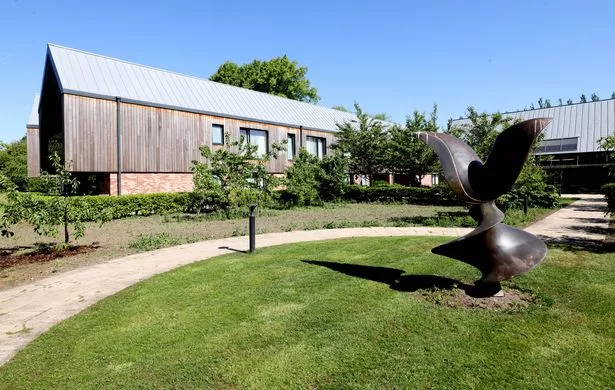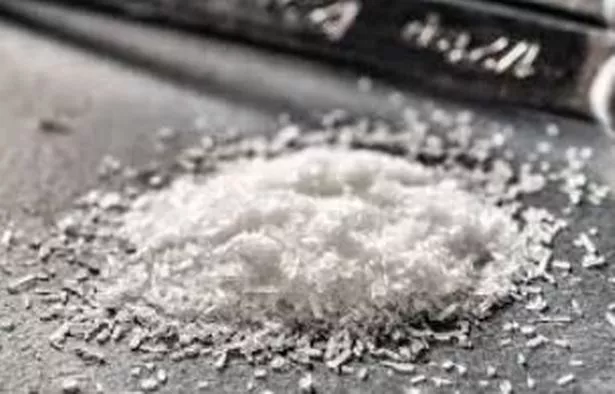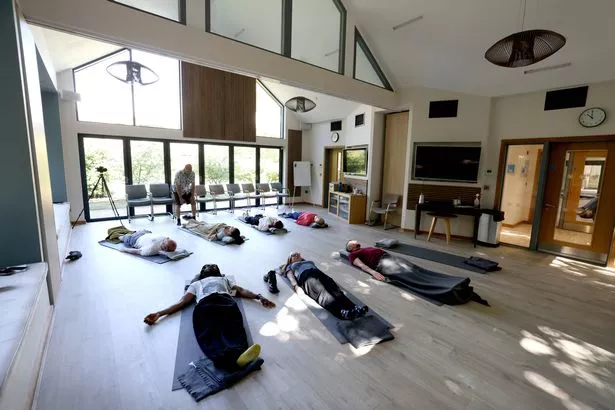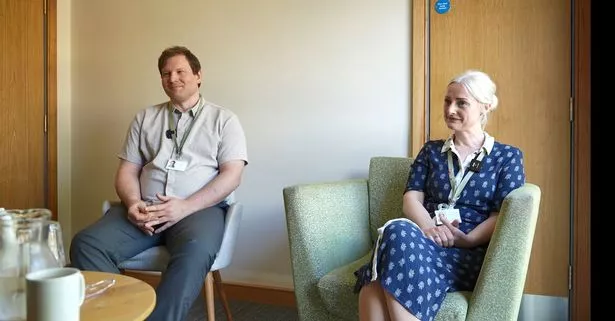SPECIAL REPORT: The Manchester Evening News goes inside the Cheshire clinic treating people with ketamine addictions Former ketamine addict Lily said the drug ‘took over her life'(Image: Manchester Evening News)
Former ketamine addict Lily said the drug ‘took over her life'(Image: Manchester Evening News)
It’s known as the cheap party drug that can put you in a dream-like state and have you back to lucidity within the hour. For many users, it starts the same – a bump in a dark club toilet or while squeezed onto a pleather sofa in someone’s damp student living room.
But it’s what users don’t know about ketamine that has allowed it to hide behind a ‘harmless’ facade. At the Delamere Clinic in Cheshire, the drug’s poisonous secrets are laid bare.
“I genuinely didn’t think you could get addicted,” 25-year-old Lily, whose name has been changed to protect her anonymity, told the Manchester Evening News. We were sat in a quiet room usually reserved for one-on-one therapy sessions. Outside, all that meets the eye is the sprawling Cheshire countryside.
 Delamere is situated in a peaceful corner of Cheshire(Image: Jason Roberts /Manchester Evening News)
Delamere is situated in a peaceful corner of Cheshire(Image: Jason Roberts /Manchester Evening News)
It’s a beautiful and serene place, but one that for Lily also brings back tough memories. She was a guest (as Delamere choose to call their clients) at the clinic last year, one of a number of young people brought in to recover from a ketamine addiction.
For her, the story had a typical start. She was a teenager and was offered a bump of ketamine by a friend. She had heard ‘through the grapevine’ ketamine was something you couldn’t get addicted to, and decided she wanted to try it.
“I still remember the first time I tried ketamine,” she recalled. “I’ll never forget it. I just connected with it so differently to how I felt when I did other drugs. Everything just slowed down. I felt like all my worries and anxieties went away – it was euphoric. I thought, I want to feel like this all the time.”
Lily started to buy and take ketamine more regularly in a bid to ‘chase’ the euphoria she experienced the first time she tried it. At first, she stuck to taking the drug on weekends and nights out. But when she went to university, drugs quickly became part of her everyday life as she became more involved with the rave scene she loved.
 Nicole Wootton-Cane interviews former guest at Delamere, 25-year-old Lily
Nicole Wootton-Cane interviews former guest at Delamere, 25-year-old Lily
“I had a group of friends where we were all doing a lot of drugs,” she said. “It became the norm. I was doing other drugs alongside it, but for me, ket was the drug I enjoyed doing the most.
“When you’re at uni it’s socially acceptable to go out during the week, so it turned from more of a weekend thing to a weekday thing. Sometimes we would do drugs in each other’s uni accommodation, so we weren’t even going out. It just became part of my life quite quickly.
“I realised early on I enjoyed it more than the average person was.”
For Lily, ketamine’s main draw was it’s sedative qualities. “I’ve always been a massive overthinker, and uppers gave me anxiety,” she said. “But ketamine stopped all the negative thoughts, it stopped the overthinking. At first, it made me think I was a better version of myself.”
But as her use continues, Lily said she moved from using ketamine for ‘fun’ to using it ‘to cope with life’.
 Ketamine is a Class B drug with sedative qualities (Image: GM Trends)
Ketamine is a Class B drug with sedative qualities (Image: GM Trends)
“I lost my friend when I was 19, and it became a way for me to grieve,” she said. “I was using it to self-medicate. I was very depressed, and it was a way for me to get through the day.”
At the same time, the physical effects were catching up with her. “My bladder was going, I was feeling more and more depressed,” she continued.
“There was a point where I would be able to stop for a month and then I’d started again, but I really realised I had a problem when I couldn’t take the breaks anymore. That’s when I realised I was in full-blown addiction.”
But it wasn’t until she woke up in the middle of the night in excruciating pain that she realised the damage she was doing to her body.
“I woke up in the middle of the night after doing ketamine all night and I had this stabbing pain around my kidneys,” she said. “I’d heard of k-cramps but I didn’t know what they were.
“It was the worst pain I’ve ever felt. It felt like being stabbed with multiple knives. I got really hot and felt really sick and I ran downstairs in my halls to the security guard and told them to call an ambulance before I collapsed.”
 Lily said living with her addiction became unbearable(Image: Manchester Evening News)
Lily said living with her addiction became unbearable(Image: Manchester Evening News)
It was the start of two years of k-cramps and bladder issues for Lily, which left her unable to go longer than 15 minutes without needing the toilet and frequency experiencing horrific pain.
“There would be points where I was sat on the toilet all night,” she recalled. “You hear about people having to get their bladders removed and getting a bag and I genuinely thought that was going to be me. I knew that, and I still couldn’t stop.”
After hitting her ‘rock bottom’ and ending up in hospital, Lily knew she couldn’t continue living the way she had and agreed to go to rehab. She says she was ‘worried’ and ‘nervous’ when she arrived, but that she wanted to ‘give it everything’.
“It was such a surreal feeling being in rehab and knowing I could come out of here sober and clean,” she said. “When you’ve been in addiction so long and it’s all you know it’s really scary to push yourself out that comfort zone. But it was the best thing I’ve ever done.”
 A breathwork session at Delamere(Image: Jason Roberts /Manchester Evening News)
A breathwork session at Delamere(Image: Jason Roberts /Manchester Evening News)
She said the day-by-day approach taken by the clinic, as well as the support from other guests, helped her commit to her recovery. She is now living back at home and says she is holding down a job and ‘doing really well’.
But looking back, Lily admits she knew very little about the long-term harmful effects of ketamine. “I had no idea,” she said. “I had heard a little bit that it could affect your bladder, but I didn’t know much about it. I wish I knew what I know now.
“I think when you’re 18 you’re not thinking about those things. You’re not thinking about your long-term health or your future, and you’re certainly not thinking you’re going to be addicted one day.”
Illegal use of ketamine has reached record levels in recent years, with an estimated 269,000 people aged 16-59 reporting using the drug in the year ending March 2024.
Guests come to Delamere to recover from all manner of addiction at all ages from 18 upwards. But staff said the guests presenting with ketamine as their ‘primary’ substance are typically aged between just 18 and 25.
Steph Massey is the head of clinical care at Delamere. She worked as a nurse for 20 years, and said it was ‘disturbing’ to see a drug with such potent and specific clinical uses in the hands of young people.
“We’ve seen a huge increase in the prevalence of young people using ketamine, even over the last 12 months,” she told the M.E.N. “It’s really disturbing for me as a nurse of all these years to know a substance that I have seen be used in a very specific way by highly trained, highly skilled, qualified doctors, to then to be in the hands of often young people without a great detailed knowledge and insight into how that drug works.”
 Chris Lomas and Steph Massey at the Delamere Clinic in Cheshire
Chris Lomas and Steph Massey at the Delamere Clinic in Cheshire
She said she thinks there is a ‘huge lack of awareness’ around the physical and cognitive consequences of sustained ketamine use – particularly when it comes to lesser known effects like vision issues and memory problems.
“Sometimes you’ll speak to someone who has been using and they’ll be experiencing symptoms but they’ll put it down to something else,” she said. “If you tell them, actually around ten per cent of ketamine users do have vision issues, they are shocked.”
Bladder problems are common among guests who bring ketamine as an issue to Delamere.
Steph added there is also a significant impact on the brain in regular users. “Over time, ketamine changes the structure of the grey and white matter in your brain, impacting cognitive function, your memory, and how you process information,” she continued.
“You enter into conversations with users and they are shocked by the magnitude of how it can affect you. And if users are shocked, that tells you a lot about what the general public know about it.”
While the body does not form a dependency on ketamine in the same way it does on alcohol, many users find themselves drawn back to the substance as a form of pain relief to help them deal with the crippling symptoms they’ve developed from chronic usage, making a vicious circle that can be difficult to break.
At Delamere, guests go through a period of detox known as ‘stop’ where they are supported by trained medical staff to withdraw from the drug completely. After that, they engage in a series of therapies and support sessions to help them overcome and understand their addiction.
“The best advice I was ever given was to take it day by day,” Lily said. “I’d always say to people who are using ketamine, just be careful. Think, do I really need to get a bag in? I know it’s marketed as a fun drug, but at some point it won’t be fun anymore.
“And always remember, if you are struggling with addiction, you are not alone.”
